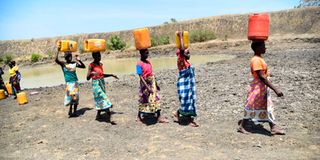Akili Dada kicks off campaign to end gender-based violence in Kilifi

Women fetch water at Bora Imani in Magarini, Kilifi County. County Director for Gender Mwangome Shumaa, says more than 3,500 SGBV cases were reported through their hotline numbers by March this year.
What you need to know:
- A non-government organisation has commenced an intergenerational dialogue campaign to end gender-based violence in Kilifi.
- Majority of the community in Kilifi grassroots do not have the right information on GBV policies and laws in place, subjecting vulnerable groups to violence.
Akili Dada, a non-government organisation, in partnership with Sustainable Development Goals (SDG) Kenya Forum and Kilifi Youth Advisory Council have kicked off an intergenerational dialogue campaign to end gender-based violence (GBV) in Kilifi.
Speaking at the launch at Mnarani Club, Akili Dada Deputy Programs Manager Diana Njuguna, said the drive is aimed at disseminating the right information on policies and laws on GBV.
“People in government are always coming up with policies and laws on gender-based violence but the community in the villages are unaware of them. This is one of the factors contributing to high cases of GBV,” said Ms Njuguna.
The campaigns will be led by the youth.
Ms Njuguna said majority of the community in Kilifi grassroots do not have the right information on GBV policies and laws in place, noting that this has subjected vulnerable groups to violence.
“The forums will bring together all players in Kilifi to speak in one voice on issues of gender-based violence,” she said.
Poverty
She noted that commercial sex among women and girls, and teenage pregnancies had soared in Kilifi due to poverty.
Winfred Mwindi from SDG Kenya Forum said cultural barriers are the main hindrance to the war against GBV and attainment of equality.
“Most men and women in the grassroots are being held back by their cultural responsibilities and do not know that they must stand up for their rights,” she said.
She noted that men in this community were unaware that they should support and protect women against GBV, adding that a majority of them are also subjected to GBV by their wives and fellow men.
Faith Mwikali from the Youth Advisory Council said the dialogues will offer the youth a platform to reach women and young girls at the grassroots to discuss GBV issues.
Currently, the council is conducting awareness programs for women and girls to speak out whenever they are abused.
Another youth, Sidi Ngumbao said lack of coordination among key players in the GBV fight was an impediment to ending the vice.
Hotline numbers
“It is time for civil society organisations, youth groups, State and non-State actors to come together and initiate interventions to address GBV in Kilifi,” she said.
Kilifi County Director for Gender Mwangome Shumaa said more than 3,500 sexual gender-based violence cases had been reported through their hotline numbers by March this year.
“Many gender-based violence cases are not being reported unless they are brought to the public’s attention. The number of cases being captured by our hotline numbers are many compared to those being reported at the police station and the courts,” he said, noting that Covid-19 had contributed to a rise in GBV.
The director said most cases are from the remote areas of Magarini, Bamba in Ganze, and Kaloleni sub-counties where communities have minimal access to public services. He also noted that incest was on the rise.





